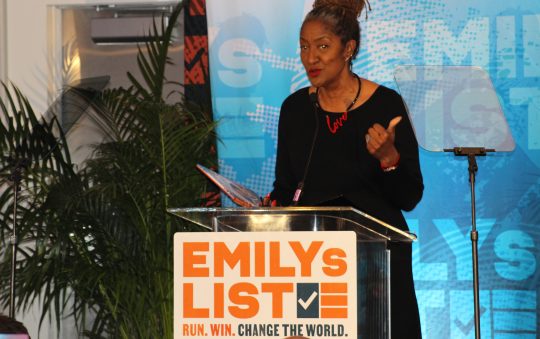
Earlier this year, I toured Vector90, the late Nipsey Hussle’s tech incubator in Crenshaw. I met a 14-year-old from Noblesville, Indiana, just a few hours south of my hometown of South Bend, who’s interested in coding. But he also told me about being called racist slurs at his school—in 2019.
From South Central to South Bend, whether it’s a Black entrepreneur denied access to capital or Black woman whose report of pain is discounted at a hospital, we know we have not yet lived up to the promise of a fully equal society. In 2017, the average per capita income was around $21,000 for Black Californians, compared to a bit more than $34,000 for White Californians.[1] Even as California has made strides in combating maternal mortality, Black women are still three to four times more likely to die from pregnancy-related complications than White women.[2] Sixty-five years after Earl Warren, a son of California, declared separate but equal inherently unequal, a UCLA study has found schools becoming increasingly segregated across the country.[3]
As the mayor of a city that is racially diverse and largely low-income, I have spent the past eight years living and breathing the successes and struggles of a community where far too many people live with the consequences of racial inequity. South Bend, like all cities, has not solved poverty or racism. But we’ve taken an unflinching look at our shortcomings–even when the results have been unflattering. And we’ve taken action.
With the support of community leaders, we established a small business accelerator in a predominantly Black neighborhood and cut Black unemployment more than half. We’ve worked to keep young people out of the criminal justice system and instituted new training and technology, like body cameras, to help bridge the divide between police and communities of color. Use of force incidents have dropped significantly, even as the tragic death of Eric Logan in June reminded us how far we have to go.
I’m proud of the work we’ve done in South Bend. But these are national challenges, requiring national solutions. The inequities we face are the result of racist policies put in place intentionally–often within living memory–and we must be equally intentional in addressing them. That’s why I have put forward the Frederick Douglass Plan, as ambitious as the Marshall Plan that rebuilt Europe, to tackle systemic racism in every aspect of American life.
It’s a plan that recognizes that everything is connected. That whenever we sit down to talk about issues like race and policing, we must also talk about issues like economic empowerment. But we can’t meaningfully address economic empowerment without talking about education. And we can’t address education without getting into the way neighborhoods are set up, and the way that impacts homeownership, and health, and even whose voice is excluded at the ballot box. So my vision is to tackle all of these challenges in a systemic way.
To close the wealth gap and promote greater economic security within the Black community, our Douglass Plan will triple the number of entrepreneurs from underserved areas within 10 years, creating over 3 million new jobs. Under my administration, the federal government will award 25 percent of federal contracts to minority- and women-owned firms. This proposal alone could invest more than $100 billion in communities of color.
My administration will dedicate $50 billion to Historically Black Colleges and Universities and other minority-serving institutions, recognizing the extraordinary role that HBCUs play as engines of empowerment.
With Black Californians facing higher mortality rates for breast and lung cancer than any other race,[4] we’ll designate Health Equity Zones to help communities target strategies for their communities and recruit more Black doctors, nurses, and health professionals.
We’ll expand affordable housing programs and deliver a 21st Century Homestead Act so that people living in historically redlined communities can acquire properties and build wealth instead of being forced out by gentrification.
We’ll invest in rehabilitation and re-entry, and do everything in our power to ensure that police are professional and accountable. We will legalize marijuana and eliminate incarceration for simple drug possession–and with reforms like that we will cut mass incarceration in half, with no increase in crime, so that California no longer locks up the third-largest prison population in the country.[5]
And we’ll build on reforms like the automatic voter registration implemented in California with a 21st Century Voting Rights Act nationwide.
I want my future children to live in a world where your race has no bearing on your health, or your wealth, or your relationship with law enforcement–a country defined not by exclusion, but by belonging. That is the America I’m determined to bring about as president.
Pete Buttigieg is the Mayor of South Bend, Indiana and a Democratic candidate for president.
[1]https://factfinder.census.gov/faces/tableservices/jsf/pages/productview.xhtml?pid=ACS_17_5YR_B19301A&prodType=table
[2] https://www.publichealthpost.org/databyte/disparities-maternal-mortality-california/
[3] https://www.civilrightsproject.ucla.edu/research/k-12-education/integration-and-diversity/harming-our-common-future-americas-segregated-schools-65-years-after-brown
[4] https://www.chcf.org/publication/2019-edition-health-disparities-by-race/
[5] https://storage.googleapis.com/vera-web-assets/downloads/Publications/people-in-prison-in-2018/legacy_downloads/people-in-prison-in-2018-updated.pdf







